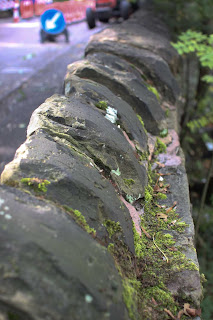It is difficult today to comprehend just how vast the Sheffield metalworking industries were, but whenever I am in town I see the evidence everywhere.
Today I was collecting wood for a spoon carving course next week. Anderson Tree Care are cutting trees from the banks of all Sheffield's rivers after the big floods in 2008. This is the worksite, trees are cut on the riverbank, winched 100 yards downstream by tractor then hoisted 100 feet into the air and dropped by the chipper with a big crane. I have a few seconds to spot the bits I want and cut them out before they disappear into the chipper. The cost of an operation like this prohibits any delay to save a spoon blank or two.
Anyway whilst I was waiting for the next tree to arrive I noticed the wall, not unlike many others built of local gritstone.
Looking from the other side though I noticed many of the coping stones were made from old grindstones.
Where they appeared they were normally in groups of 4 showing that the stone had been rolled to the spot from a nearby mill then quartered.
A friend lives in Hathersage next door to an old mill where they made needles, now you would not think that needles would wear out grindstones very fast, not like a scythe works say but this is their garden wall.
And a closer look at a few spares. Anyone who has done a serious amount of grinding will know that each of these stones has done many thousands of hours work. The fact that they are everywhere shows just how much a part of the fabric literally of the city grinders were.
Today there is as far as I know only one full time self employed grinder left in the city, a lovely bloke called Brian Alcock.
This is a short film Nicola made a couple of years ago when Brian was teaching our friend Grace how to grind pen knife blades with a suitably Sheffield soundtrack.
Subscribe to:
Post Comments (Atom)













No comments:
Post a Comment